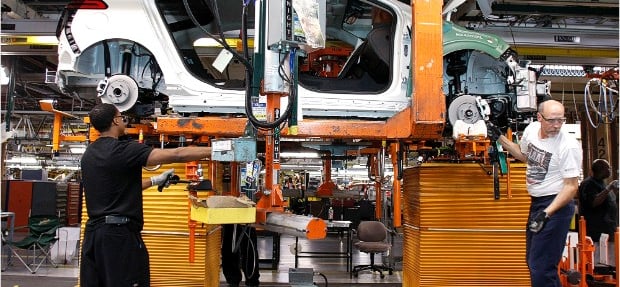Detroit’s Automotive Industry: How the Motor City is Reinventing Itself for the Future
Explore how Detroit’s automotive industry is transforming through innovation, electric vehicles, and new technologies, securing its place as a leader in the evolving auto market.
BUSINESS
8/10/20253 min read
Detroit has long been known as the Motor City, the beating heart of America’s automotive industry. For over a century, it was the symbol of American manufacturing might and innovation. From the days when the Big Three automakers dominated the global market to the challenges of recent decades, Detroit’s story has been one of resilience and transformation.
Today, the city and its automotive industry are reinventing themselves. With advances in electric vehicles, smart technology, and sustainable manufacturing, Detroit is poised to lead the future of transportation once again. Let’s dive into how this iconic industry is evolving and what it means for the city, the economy, and the global auto market.
A Rich Legacy Facing New Challenges
Detroit’s automotive roots run deep. The city was home to Henry Ford’s revolutionary assembly line that made cars affordable for millions. General Motors, Chrysler, and Ford – the Big Three – made Detroit a powerhouse for jobs and innovation. The industry shaped the city’s culture, economy, and identity for generations.
However, the last few decades brought significant challenges. Global competition intensified, manufacturing jobs declined, and the 2008 financial crisis hit Detroit’s economy hard. The city even filed for bankruptcy in 2013. The automotive industry had to rethink its future.
Embracing Electric Vehicles and Green Technology
One of the biggest shifts in Detroit’s automotive landscape is the move toward electric vehicles, or EVs. Major automakers headquartered in the city have made substantial investments in EV development, aiming to reduce carbon emissions and meet changing consumer demands.
Companies like General Motors have announced ambitious plans to electrify their entire lineup in the coming decades. They are investing billions in battery technology, electric motors, and charging infrastructure. These efforts not only help fight climate change but also create new manufacturing and engineering jobs in Detroit and surrounding areas.
Innovation and Smart Mobility
Detroit’s automotive reinvention goes beyond electric vehicles. The city is embracing smart mobility technologies such as autonomous driving, connected cars, and ride-sharing platforms. Several startups and tech companies have set up shop in Detroit to collaborate with legacy automakers on cutting-edge solutions.
Autonomous vehicle research is accelerating, with testing on city streets and highways. Connected car technology allows vehicles to communicate with each other and with infrastructure, improving safety and efficiency. These innovations are shaping the way people will move in cities in the near future.
Revitalizing Manufacturing and Workforce
To support this transformation, Detroit is revitalizing its manufacturing base. Factories are upgrading to produce electric vehicle components, lightweight materials, and advanced electronics. This modernization is crucial to maintaining Detroit’s competitive edge in a global market.
Workforce development is another key focus. Training programs are helping workers transition from traditional auto jobs to new roles in technology and green manufacturing. Local universities and community colleges are partnering with automakers to provide specialized education and apprenticeships.
Supporting Small Businesses and Startups
Detroit’s automotive future also includes a thriving ecosystem of small businesses and startups. These companies bring agility and fresh ideas, often focusing on niche markets like electric bike manufacturing, battery recycling, or software development for connected vehicles.
The city has launched innovation hubs and business incubators to nurture these ventures. Public and private investment is fueling entrepreneurship, creating new opportunities for Detroit’s economy beyond the Big Three.
Sustainability and Community Impact
The shift to sustainable automotive production is not just about technology. Detroit’s industry leaders are also investing in community development and environmental stewardship. Cleaner manufacturing processes, renewable energy usage, and waste reduction efforts are becoming industry standards.
These efforts help improve air quality and public health in the city. They also contribute to Detroit’s overall revitalization by attracting environmentally conscious workers and investors.
Challenges Still Ahead
While Detroit’s automotive industry is making exciting strides, challenges remain. Global supply chain disruptions, competition from international automakers, and regulatory pressures require constant adaptation.
Additionally, ensuring equitable economic benefits for all Detroit residents is critical. The city’s leadership is focused on inclusive growth strategies to make sure new jobs and opportunities reach underserved communities.
Looking Forward: Detroit’s Place in the Global Auto Market
Detroit’s reinvention is a powerful example of resilience and innovation. By embracing electric vehicles, smart technology, and sustainable practices, the Motor City is once again positioning itself as a leader in the automotive world.
The industry’s transformation will continue to shape Detroit’s economy and culture for years to come. For residents and businesses alike, this new era promises opportunity and growth in a city proud of its heritage but focused firmly on the future.
Conclusion
Detroit’s automotive industry is not just surviving; it is thriving by reinventing itself. Through bold investments in electric vehicles, cutting-edge technology, workforce development, and sustainability, the Motor City remains a vital hub of innovation. For anyone interested in the future of transportation, Detroit’s story is one to watch.


